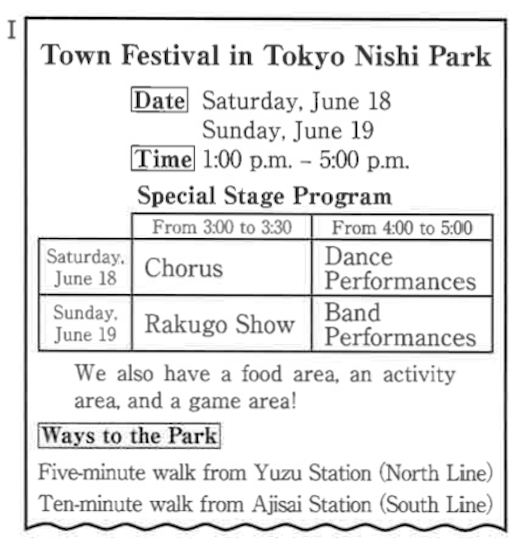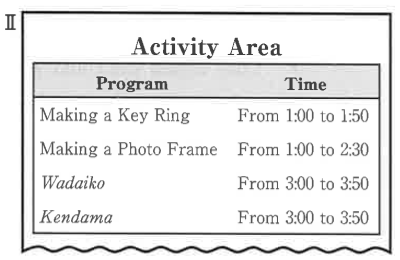最後に、傾向と対策・高校入試のしくみなどへのLINKがあります。
【2】
次の各問に答えよ。(*印の付いている語句には、本文のあとに〔注〕がある。)
1 高校生の Akariとアメリカからの留学生のLucyは、ある週末の予定について話をしている。( A )及び( B )の中に、それぞれ入る単語・語句の組み合わせとして正しいものは、下のア~エのうちではどれか。ただし、Iは、二人が見ているタウンフェスティバルのチラシの一部である。
Akari: Hi, Lucy. Do you have a plan forthe weekend?
Lucy: Nothing special.
Akari: OK. There is a town festival for twodays at Tokyo Nishi Park this weekend.This is information about it.Can you come with me?
Lucy: Sure. I’m free on both Saturday and Sunday.
Akari: A friend told me she would play in Band Performances from four o’clock.
Lucy: Oh, I love music. I want to see the performances.
Akari: Then let’s go there on ( A )
Lucy: What else can we enjoy at the festival?
Akari: Food, activities, and games…. We can enjoy many things.
Lucy: What activities can we do?

Akari: When I came to the festival last year, I did Painting a Plate and experienced Tea Ceremony, sado. I think we can do some things like that.
Lucy: Sounds exciting.
Akari: Well, do you know how to get to the park?
Lucy: I’m not sure. Should we go to Yuzu Station? It is closer than Ajisai Station to the park. But I’ve never taken the North Line. I usually take the South Line to go to school.
Akari: The nearest station on the North Line from your house is Sumire Station. If we used that station, you would need to take a bus to get there and that would take a long time.
Lucy: Really? So, you mean we should go to (B) | , right?
Akari: Yes. Then you can use the line that you usually use. Let’s meet there at twelve thirty.
ア ( A )Saturday ( B )Yuzu Station
イ ( A )Sunday ( B )Yuzu Station
ウ ( A )Saturday ( B )Ajisai Station
エ ( A )Sunday ( B )Ajisai Station
正解:●●●
2 Akari と Lucy は,タウンフェスティバルの会場で、タウンフェスティバルのパンフレットを見ながら午後の予定について話をしている。( A )及び( B )の中に、それぞれ入る単語・語句の組み合わせとして正しいものは、右のページのア〜エのうちではどれか。ただし、右のページのIIは二人が見ているパンフレットの一部である。
Akari: It’s twelve forty-five now. Look. The activity area has different kinds of activities.Let’s do two of them before four o’clock.
Lucy: Yes, let’s.
Akari: Two activities are from one o’clock and the other activities are from three o’clock. We can do Making a *Key Ring or Making a *Photo Frame first. Which should we do?
Lucy: How about doing ( A )? I want to make one for my sister.

Akari: Good idea. And, if we choose that, we will have time to go to the food area and the game area.
Lucy: Yes. We will be able to enjoy them for about one hour before the activities that start at three o’clock.
Akari: What should we do from three o’clock?
Lucy: Let’s see…, both activities look good to me.
Akari: I often played kendama when I was an elementary school student. Have you played it before?
Lucy: I have seen it, but I’ve never played it. Is it fun?
Akari: Yes. It’s a lot of fun, but it may be a little difficult for you.
Lucy: I see. Well, I know about the other activity. I have played one in a music class before. It was very exciting.
Akari: Oh, you enjoyed it.
Lucy: I want to do it again. So I choose ( B )
〔注〕 key ring キーホルダー photo frame 写真立て
ア (A) Making a Key Ring (B) Wadaiko
イ (A) Making a Key Ring (B) Kendama
ウ (A) Making a Photo Frame (B) Wadaiko
エ (A) Making a Photo Frame (B) Kendama
正解:●●●
3 次の文章は、アメリカに帰国した LucyがAkariに送ったEメールの内容である。
Dear Akari,
Thank you for everything while I was in Japan. I enjoyed visiting various places with you.The Town Festival was one of them. I talked with many people there in Japanese. It was a good experience for me. Through my stay in Japan, I realized using Japanese was a lot of fun.
I am still studying Japanese in America. Recently, I have been writing a diary in Japanese. It is for my Japanese class. At first, it was very difficult for me. But my Japanese class teacher said to me, “Practicing is important.” I practice writing more and more every day at home. My Japanese class teacher sometimes gives me advice about my Japanese. Yesterday, I showed my diary to him. He read it and said to me,”Your Japanese is getting better!” I was happy to hear that. I will keep practicing Japanese very hard. I hope I can write a letter in Japanese to you someday.
Do you have something that you want to practice more? Please tell me about it.I’m looking forward to hearing from you soon.
Yours,
Lucy
(1) このEメールの内容と合っているのは、次のうちではどれか。
ア Lucy hoped she could write a letter in Japanese to her Japanese class teacher someday.
イ Lucy sometimes got advice from Akari about her Japanese in America.
ウ Lucy was happy because she heard her Japanese was getting better.
エ Lucy was writing a diary in English for her English class.
正解:●●●
(2) Akari は Lucy に返事のEメールを送ることにしました。あなたがAkari だとしたら、Lucyにどのような返事のEメールを送りますか。次のく条件>に合うように、下の【 】の中に、三つの英語の文を書きなさい。
<条件>
前後の文につながるように書き、全体としてまとまりのある返事のEメールとすること。
Lucy に伝えたい内容を一つ取り上げ、それを取り上げた理由などを含めること。
Hello, Lucy,
Thank you for your e-mail. I hope you are well. I really enjoyed spending time with you in Japan. I’m happy to hear that you are still practicing Japanese.
I will answer your question. You asked me, “Do you have something that you want to practice more?” I’ll tell you one thing.
【 】
I hope to visit some places in Japan with you when we meet again.I’m looking forward to getting a letter in Japanese from you.
Your friend,
Akari
解答例:
●●●
【3】
次の対話の文章を読んで、あとの各問に答えよ。(*印の付いている単語には、本文のあとに〔注〕がある。)
Koji, Yuka, and Akito are junior high school students in Tokyo. Olivia is a student fromAustralia. They are talking in their classroom after school.
Коjі:What are you reading, Yuka?
Yuka: I’m reading a book about stars. I like looking at stars.
Olivia: Do you know about stars seen from Australia? (1)They are wonderful.
Yuka: I know. I have seen them on TV.
Akito: Oh, are you interested in stars?
Yuka:Yes. Now I sometimes go to a science museum to learn about them. I enjoy learning about stars thanks to my sister.
Коji:She is in elementary school, right?
Yuka: That’s right. This summer, I saw stars from the top of a mountain with my family.She explained about one bright star to me.
Olivia: Did you become interested in stars then?
Yuka:Yes. Then I started to learn more about them.
Akito:(2)That’s nice, Yuka.
Yuka:Thank you.
Akito:I’m interested in many things, but I don’t usually try to learn more about them.
Yuka:Learning is fun. I also enjoy science class. I want to visit Australia to see beautiful stars someday.
Olivia: That’s nice.
Akito: Do you have something that you are interested in, Olivia?
Olivia: Yes. Japanese food. Onigiri is my favorite. I tried some in Australia, but I was surprised to see so many kinds of onigiri in Japan. And I can get delicious onigiri easily at convenience stores.
Yuka: I see.
Olivia: I learned that some of them included local products from different areas in Japan. For example, I found onigiri with kombu from Hokkaido and with umeboshi from Wakayama.That was interesting for me. (3)After that, I started to learn more about Japanese food.
Akito: What do you mean?
Olivia: First, I checked some websites to learn about onigiri. I found out why some prefectures have become famous for their local products. Now I know more about the *geography of Japan. Things in daily life can become a good start for learning.
Koji: I agree with you. I sometimes learn about English words seen in textbooks and in other places.
Akito: For example?
Koji: I learned the expression “free time” in English class last year. Last month, I saw the expression “free ticket” on the Internet. (4)Then I got interested in the word “free”.
Olivia: What was interesting about it, Koji?
Koji: The word “free” was used with different meanings. I didn’t know why “free” was used in that way.
Akito: I have never thought about that. What did you do?
Koji: I used my dictionary at home and checked “free,” but I didn’t understand the reason.The next day, I asked my English teacher, Ms. Evans, about the word. She taught me about the word and some other expressions using “free”.
Akito: I think you enjoy learning, Koji.
Yuka: Akito, you can also start learning about something you are interested in. For example, your favorite movies, books, or this town.
Akito: This town…. When I was waiting for friends near our school, I saw a sign on a street on a * hill.
Olivia: A sign? What did it say?
Akito: The history of the street was written on it. The name of the street was the name of a famous person from the Edo *period. That person lived near the street.
Koj: There are some other streets on hills. How about looking for signs about them?I know some of them have names.
Akito:(5)That’s a good idea. I think that learning more about this town may be a good chance to enjoy learning history. I’ll go around and look for some more signs today.
Olivia: I want to go with you.
Koji: Let’s all go together.
Yuka: Sounds exciting.
〔注〕geography 地理 hill 坂 period 時代
〔問1〕(1)They are wonderfulの内容を最もよく表しているのは、次のうちではどれか。
ア Olivia thinks stars seen on TV are wonderful.
イ Olivia thinks stars seen in a book are wonderful.
ウ Olivia thinks stars seen from Australia are wonderful.
エ Olivia thinks stars seen in a science museum are wonderful.
正解:●●●
〔問2〕(2)That’s nice, Yuka.とあるが、このようにAkitoが言った理由を最もよく表しているのは、次のうちではどれか。
ア Yuka became interested in stars and started to learn more about them.
イ Yuka visited Australia to see beautiful stars.
ウ Yuka enjoys learning about stars thanks to Akito.
エ Yuka went to an elementary school with her sister to learn about stars.
正解:●●●
〔問3〕(3)After that, I started to learn more about Japanese food.の内容を、次のように書き表すとすれば、【 】の中に、下のどれを入れるのがよいか。
After Olivia learned that some onigiri included local products,【 】.
ア I she found onigiri with kombu from Hokkaido and with umeboshi from Wakayama
イ she found out why some prefectures have become famous for their local products
ウ she learned she could get delicious onigiri easily at convenience stores
エ she learned there are many kinds of onigiri in Japan
正解:●●●
〔問4〕(4)Then I got interested in the word “free”とあるが、このようにKojiが言った理由を最もよく表しているのは、次のうちではどれか。
ア Koji saw the expression “free time” on the Internet last month.
イ Koji didn’t learn any expression using “free” in English class last year.
ウ Koji used his dictionary to check the meaning of the word “free” at home.
エ Koji didn’t know why “free” was used with different meanings in two expressions.
正解:●●●
〔問5〕(5)That’s a good ideaの内容を最もよく表しているのは、次のうちではどれか。
ア Going around the town with friends is a good idea for Akito.
イ Looking for signs about other streets on hills is a good idea for Akito.
ウ Seeing the person who lived near the street on a hill is a good idea for Akito.
エ Learning about the name of a famous person from the Edo period is a good idea for Akito.
正解:●●●
〔問6〕 次の英語の文を、本文の内容と合うように完成するには、【 】の中に、下のどれを入れるのがよいか。
Olivia said she learned about her favorite Japanese food from 【 】.
ア websites
イ signs
ウ textbooks
エ movies
正解:●●●
〔問7〕次の文章は、Koji たちと話した日に、Olivia が書いた日記の一部である。( A )及び( B )の中に、それぞれ入る単語の組み合わせとして正しいものは、下のア~エのうちではどれか。
Today, I talked with my friends Koji, Yuka, and Akito about learning new things. sister Yuka was interested in stars.When she went to a mountain, her ( A )her about a star. Then Yuka started to learn about stars. I talked about one of my experiences with Japanese food. Onigiri became a ( B ) for me to learn more about the geography of Japan. I think we can start learning about things in our daily lives. When Koji wanted to learn about a word in English, he asked a teacher, Ms. Evans. She ( A ) him about the word “free”.He enjoys studying English. I hope looking for signs will give Akito a enjoy learning.
ア (A) asked (B) chance
イ (A) asked (B) product
ウ (A) taught (B) chance
エ (A) taught (B) product
正解:●●●
【4】
次の文章を読んで、あとの各問に答えよ。(*印の付いている単語には、本文のあとに〔注〕がある。)
Shota was a first-year high school student. In July, he and one of his friends, Kento, saw a poster at school about summer volunteer programs for high school students. There was a list of the programs on the poster. Shota found some programs that he was interested in, such as working at an art museum or at a library. Kento was also interested in the volunteer programs.He said, “Volunteer work at an art museum. I don’t know much about art, but I’ll try that.The work sounds interesting.” Shota also wanted to do that. But he always got nervous when he tried something new. He thought that he couldn’t do the volunteer work and felt sad.
One day in the summer vacation, Shota visited the art museum which was on the list of volunteer programs. He wanted to see famous pictures. Some high school students were doing volunteer work there. Some students were standing near the entrance and telling people where to go first. Shota saw Kento in the museum shop. Kento was putting some cups and books on shelves. Those goods had famous pictures on them. He saw Shota and said, “I’m happy to see you here, Shota. Have a good time!” Then one woman asked Kento questions about an artist. He answered her with a smile. Shota was surprised and said to him, “You explained that well” Kento said, “Thank you. I learned about famous artists from the staff. I really like this job.” Kento looked very happy.
After Shota got home, he talked with his older sister, Emi. Shota said, “I went to an art museum to see famous pictures. Kento is doing volunteer work there and having a good experience. I wish I could try new things like him.” She said, “I know. You should stop worrying too much when you are thinking about trying something new. Are you interested in doing volunteer work?” Shota said, “Well, I like this city, and I’d like to work for local people.” Emi hoped that he could do it.
One day in September, Emi showed Shota a poster about the local sports day. She knew the local *committee members were looking for some high school students to work on the day as volunteer staff. Emi said, “You said you wanted to work for local people. I hope this will be a good chance for you to do that.” Shota was very interested, but he was also nervous. Emi continued,”I did this work last year. I worked on relays as a staff member. I was happy to help runners.I cannot do that work this year, but I think you should try it.” Shota finally decided to do the work.
On the local sports day, many people came and enjoyed sports. Shota was nervous, but he did the job he was told to do. It was to guide people to gates. During a break time, he saw some staff members who were trying to carry many water bottles. At first, he didn’t say anything to them, but he wanted to help them. Then he asked one of the staff members, “Can I help you carry these?” The staff member said, “Yes, please.” After they finished carrying them, the staff member said, “Thank you for helping us, Shota.” He was so happy about it that he tried to help other staff members, too. Kento was also there. He was with his family to enjoy the day. He saw Shota. Kento went to him and said, “We are having fun. How is your job?” Shota said, “Great!” Shota was very busy, but he enjoyed the day.
Later, Shota talked with Emi at home. He said, “Thank you so much for encouraging me to try to do the work.” Emi said, “I gave you information about the sports day. You decided to do the work and helped staff members and other people. That was great.” Shota smiled and said, “I learned one thing today. It is important for me to take action without worrying.” Shota got *confidence through the experience. He was proud of himself.
〔注〕 committee 委員会 confidence 自信
〔問1] Shota also wanted to do that.の内容を、次のように書き表すとすれば、【 】の中に、下のどれを入れるのがよいか。
Shota also wanted 【 】.
ア to find volunteer programs, such as working at an art museum or a library
イ to see a poster about volunteer programs for high school students
ウ to try the summer volunteer work at an art museum
エ to get interested in the summer volunteer programs
正解:●●●
〔問2〕次のア~エの文を、本文の内容の流れに沿って並べ、記号で答えよ。
ア Shota heard that Kento really liked the volunteer work.
イ Shota was very busy during the local sports day, but he enjoyed the day.
ウ Shota visited the art museum that was on the list of volunteer programs.
エ Shota said that he would like to work for local people.
正解:●●●
〔問3〕次の(1)~(3)の文を、本文の内容と合うように完成するには、【 】の中にそれぞれ下のどれを入れるのがよいか。
(1) When Shota saw Kento in the museum shop,【 】.
ア Kento was standing near the entrance and telling people where to go first
イ Kento was putting some cups and books on shelves
ウ Kento was learning about famous artists from the staff
エ Kento was asking questions about an artist to a woman there
正解:●●●
(2) After Shota got home from the art museum, Emi told him that 【 】.
ア he should talk with Kento about trying new things
イ he would have a good experience when he was doing volunteer work with Kento
ウ he should stop worrying too much when he was thinking about trying something new
エ he would see famous pictures there and got interested in art
正解:●●●
(3) On the local sports day,【 】.
ア Shota was told to guide people to gates
イ Shota went to Kento’s family and talked to them
ウ Shota was so nervous that he couldn’t do his job
エ Shota asked the staff to help him carry water bottles
正解:●●●
〔問4〕 次の(1),(2)の質問の答えとして適切なものは、それぞれ下のうちではどれか。
(1) Why did Emi show Shota a poster about the local sports day?
ア Because she hoped it would be a good chance for him to look for other students to work on that day.
イ Because she hoped it would be a good chance for him to work for local people.
ウ Because she wanted Shota to enjoy a relay as a runner on that day.
エ Because she wanted Shota to do volunteer work with her.
正解:●●●
(2) What did Shota learn through the experience of his volunteer work?
ア He learned that it was important for him to help Emi to decide to do volunteer work.
イ He learned that giving information to staff members was important for him.
ウ He learned that it was important for him to be encouraged by other people.
エ He learned that taking action without worrying was important for him.
正解:●●●
東京都教育委員会のホームページより、最新の情報が得られます。必要に応じて、見るようにしましょう!






